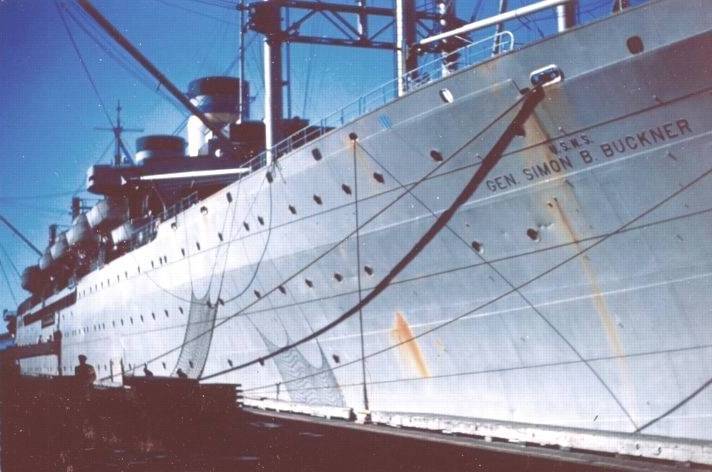
The trip to Vietnam on the Buckner

Click on thumbnail below to see full size image
 Larry May, and Pete
Cullen, left, spent part of the reunion period this year recalling their voyage
to the Far East on a troop ship called the Simon B. Buckner. Prior to their
voyage they had been assigned to D Company, 87th Infantry Battalion, a
provisional unit which was quartered at the 3rd Brigade's old barracks at Fort
Lewis after we left in Sept, 1966.
Larry May, and Pete
Cullen, left, spent part of the reunion period this year recalling their voyage
to the Far East on a troop ship called the Simon B. Buckner. Prior to their
voyage they had been assigned to D Company, 87th Infantry Battalion, a
provisional unit which was quartered at the 3rd Brigade's old barracks at Fort
Lewis after we left in Sept, 1966.
They collected their remembrances and are sharing them for this article. If you traveled by ship on your way to Vietnam much of their story will be familiar. I suppose they were probably similar for all deploying American troops to overseas engagements during the 20th Century.
Peter Cullen
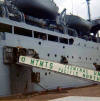 "We left for Vietnam from Tacoma Washington, not
much later than the 3rd Brigade of the 4th ID's deployment. Our sail date was
November 8th. Our ship was the General Simon B. Buckner, a troop ship
operated by the Merchants Marines.
"We left for Vietnam from Tacoma Washington, not
much later than the 3rd Brigade of the 4th ID's deployment. Our sail date was
November 8th. Our ship was the General Simon B. Buckner, a troop ship
operated by the Merchants Marines.
I recall
that the Army stevedores couldn't get our equipment transpo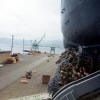 rted
to the hold
with the cranes and the civilians workers were brought in to complete the task
with little trouble. I was impressed with
the skill they displayed in making the equipment transfer to the ship.
rted
to the hold
with the cranes and the civilians workers were brought in to complete the task
with little trouble. I was impressed with
the skill they displayed in making the equipment transfer to the ship.
Before leaving Tacoma an Army band was brought to our dock to play some tunes as
we were sent on our way…."
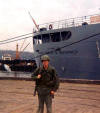 Larry
May (seen on dock before boarding)
Larry
May (seen on dock before boarding)
"I remember Company D, 87th Infantry’s 23-day sail to
the sunny be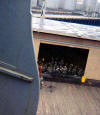 aches
of Vietnam and the South China Sea. Pete described the small band on the dock
that played patriotic
marches we could barely hear as we slipped away
from that empty and seemingly forlorn wharf
to begin our journey. As the Buckner moved away from its berth I remember
leaning on the ship’s rail to keep the
landing sight as long as possible. A guy I didn’t know was next to me listening
to a Vancouver station on a small portable
radio. The song being played as the
shores of our country slipped away in the phosphorescent
wake of the Buckner was “The Sweetheart Tree, arranged and played by Andre
Kostelanitz. To this day I can hum that melody, quite out of tune to anyone but
me I am sure. It never fails to make me think about slow dancing with my wife
Susan, and recall the last winking of lights from our home shores passing from
view in the darkness…"
aches
of Vietnam and the South China Sea. Pete described the small band on the dock
that played patriotic
marches we could barely hear as we slipped away
from that empty and seemingly forlorn wharf
to begin our journey. As the Buckner moved away from its berth I remember
leaning on the ship’s rail to keep the
landing sight as long as possible. A guy I didn’t know was next to me listening
to a Vancouver station on a small portable
radio. The song being played as the
shores of our country slipped away in the phosphorescent
wake of the Buckner was “The Sweetheart Tree, arranged and played by Andre
Kostelanitz. To this day I can hum that melody, quite out of tune to anyone but
me I am sure. It never fails to make me think about slow dancing with my wife
Susan, and recall the last winking of lights from our home shores passing from
view in the darkness…"
Map sources,
internet: www.gonorthwest.com/Washington/puget/map_puget.htm,
http://tourismvictoria.com/Content/EN/1057.asp
Peter Cullen
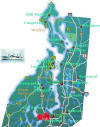 "....As
our ship passed through Puget Sound
(shown left), I guess everyone felt uneasy leaving the U.S. for the unknown that
we would face in Vietnam. I wondered if I would ever see America again. Larry
May, Ed Walker, Tex Byerly, Joe Bonin, myself and others on that were on that
ship would ultimately be transferr
"....As
our ship passed through Puget Sound
(shown left), I guess everyone felt uneasy leaving the U.S. for the unknown that
we would face in Vietnam. I wondered if I would ever see America again. Larry
May, Ed Walker, Tex Byerly, Joe Bonin, myself and others on that were on that
ship would ultimately be transferr ed
to A/2/12. Steaming out of Washington, I was amazed at the vastness of the
Sound. The last view of North America was the sight of Victoria, British
Columbia as we exited Puget Sound and headed for the open seas of the Pacific.
ed
to A/2/12. Steaming out of Washington, I was amazed at the vastness of the
Sound. The last view of North America was the sight of Victoria, British
Columbia as we exited Puget Sound and headed for the open seas of the Pacific.
On the morning after our departure I was astonished to discover that the
seagulls from Puget Sound were still trailing our ship. I was told that they
were in pursuit of food scraps. They gave up only two days later and we were
well on our way…."
Larry May
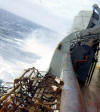 "…The
next morning when we clamored topside, the wind smelled of the sea, and
everything looked grey: the overcast skies were a dark grey, the ship’s
bulkheads were grey, the seas appeared a greasy grey color, and the faces of
many of the Buckner’s passengers looked pallid and grey, too. As the Buckner’s
bow sliced through the seemingly massive Pacific “rollers” coming our way, a lot
of the guys took to carrying “barf” bags in case they became victims of sea
sickness. It was really something to see someone throw up, and successfully
capture the bile and contents of his churning stomach in that bag. Then to watch
the guy glance sheepishly around and through the bag over the side to get rid of
the vile mess he had created, only to have the 19 knot wind of the Buckner
underway hurl the bag back onto soldiers nearby who then reacted to the
unpleasant trigger of the guy’s vomit, by vomiting themselves. I remember when
anyone vomited and got it into the barf bags, the men nearby would clap and
cheer for the poor guy’s success in hitting the barf bag…"
"…The
next morning when we clamored topside, the wind smelled of the sea, and
everything looked grey: the overcast skies were a dark grey, the ship’s
bulkheads were grey, the seas appeared a greasy grey color, and the faces of
many of the Buckner’s passengers looked pallid and grey, too. As the Buckner’s
bow sliced through the seemingly massive Pacific “rollers” coming our way, a lot
of the guys took to carrying “barf” bags in case they became victims of sea
sickness. It was really something to see someone throw up, and successfully
capture the bile and contents of his churning stomach in that bag. Then to watch
the guy glance sheepishly around and through the bag over the side to get rid of
the vile mess he had created, only to have the 19 knot wind of the Buckner
underway hurl the bag back onto soldiers nearby who then reacted to the
unpleasant trigger of the guy’s vomit, by vomiting themselves. I remember when
anyone vomited and got it into the barf bags, the men nearby would clap and
cheer for the poor guy’s success in hitting the barf bag…"
Peter Cullen
"…The ship was crowded with soldiers. We were told to wear regular shoes instead of our boots in the e vent that we had to abandon ship. It was much easier to tread water without combat boots to weigh you down. I had a bunk on the third bunk level in the troop bay I was assigned to. At night there were times that I didn't feel well from the ship's motion, but I never got sick. There were some soldiers who remained sick all the way to Vietnam.
The milk they served was spoiled almost from the day we boarded and had a yellow color to it. Most of us opted for a kool aid drink that we called 'Bug Juice'.
My job on the ship was to work in the laundry room. It was real hot working down there but time past quickly and a merchant seaman from Aruba treated us well. Each night he would get us a cake from the galley to enjoy."
Larry May
"…I remember the chow line and how
the tables had a lip that prevented the meals on the metal trays from sliding
away and off the table as the ship rolled, pitched and yawed over those Pacific
rollers. While you were trying to eat, sometimes you might be near a porthole
where you could really see the horizon shifting and gyrating as the ship plowed
westward. Sometimes that sight was disturbing enough to prompt you to get up on
your rubbery legs and move awkwardly away from the smell of powdered eggs,
grease and the disgusting stuff they tried to pass off as “milk.”
It's funny, the things that you remember sometimes. We had to contend with the
cha nging
fluid levels in the toilets changing as the ship pitched: water and the “other”
contents of the toilet dropped substantially as the bow dropped and the stern
where the fantail heads were rose sharply, then as the bow sharply rose when it
hit the next roller the stern dropped causing the toilet bowl contents to rise
alarmingly close to one’s anatomy in the nether regions. That really got to a
lot of the guys…"
nging
fluid levels in the toilets changing as the ship pitched: water and the “other”
contents of the toilet dropped substantially as the bow dropped and the stern
where the fantail heads were rose sharply, then as the bow sharply rose when it
hit the next roller the stern dropped causing the toilet bowl contents to rise
alarmingly close to one’s anatomy in the nether regions. That really got to a
lot of the guys…"
Peter Cullen
"…As soon as the seagulls stopped following us we began to encounter the flying
fish. I had never seen them before so they were fascinating to watch from the
deck.
I recall lines, long lines, anywhere the enlisted men were being served.
Enlisted men were also restricted to a small portion of the ship.
The crewing of the ship was performed by
merchant seamen. The only Navy Personnel on board were the hospital corpsmen. I
had a toothache from the time we left Tacoma. Along the way
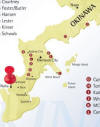 we
stopped in Naha, Okinowa (see map left) and a corpsman who was helping me with
my pain thought that he could get me ashore there to have the tooth pulled. That
never came to pass as no soldier would be allowed ashore because of past
incidents with unruly soldiers that were allowed to disembark their ships. I
waited to arrive in Vietnam to have the bad tooth dealt with.
we
stopped in Naha, Okinowa (see map left) and a corpsman who was helping me with
my pain thought that he could get me ashore there to have the tooth pulled. That
never came to pass as no soldier would be allowed ashore because of past
incidents with unruly soldiers that were allowed to disembark their ships. I
waited to arrive in Vietnam to have the bad tooth dealt with.
Luckily, some Okinawans provided some relief in the form of bottles of Japanese
sake and cheap whiskey that were purchased for a dollar each. The major build up
in Vietnam was in high gear by then, so the locals knew that they had a ready
market of young soldiers who would be only to happy to exchange a bit of
American currency for some spirits. Yes, just lower a rope with a buck tied to
it and these entrepreneurs would exchange the bill for the desired refreshments.
The free enterprise system at it's best!"
Larry May
"… I remember trying to do PT on the pitching decks. Jumping jacks and pushups became a real challenge, or exceptionally easy depending on the ship’s movements and whether the deck was falling away from under you as you moved in cadence. I also remember the long games of Casino, Hearts or five-Card Draw that could occupy people’s time and result in a redistribution of pocket change or wallet dollars from our last payday. Most of all I remember discussing with Ed Walker, Bobby Joe Bonin and other D/87 men the fact that in civilian life, people actually paid big time bucks for sea cruises like ours, well maybe not quite like ours."
Peter Cullen
"…When we pulled out of Okinawa, I witnessed an ugly incident when US Army troops stationed on the island began hurling empty bottles at our ship. I was told that the episode had racial overtones to it. It just seemed bazaar that American troops would behave that way.
![]() The
day after leaving Okinawa was Thanksgiving Day. We had the traditional meal for
that day, turkey and all. It was the only 'good' meal we had on board ship.
The
day after leaving Okinawa was Thanksgiving Day. We had the traditional meal for
that day, turkey and all. It was the only 'good' meal we had on board ship.
![]()
![]()
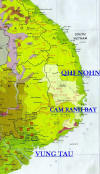 The following day we arrived in Qhi Nohn and got our first glimpse of Vietnam.
It was lush and green unlike anything I had seen before. There was a unit that
was to disembark at Qhi Nohn but that was prevented by rough seas so we were
forced to stay off shore for a day to allow for a safer transfer.
The following day we arrived in Qhi Nohn and got our first glimpse of Vietnam.
It was lush and green unlike anything I had seen before. There was a unit that
was to disembark at Qhi Nohn but that was prevented by rough seas so we were
forced to stay off shore for a day to allow for a safer transfer.
Our next destination was Cam Ranh Bay. As
we approached Vung Tau I witnessed thousands of yellow sea snakes entwined like
pasta in a bowl. I later read that what I was witnessing was a sea snake mating
frenzy that occurs periodically. The water at Vung Tau
was gorgeous, with a beautiful turquoise hue to it. The bay contained lovely
sandy beaches.
Eventually we made our way to Vung Tau and our disembark point. We boarded LSIs
(Landing Ships for Infantry troops) which transported us to the beach at Vung
Tau. When the front gate dropped down and we were allowed to step on land once
more, my first impression was how hot and humid it was. The day had finally
arrived. Hello Vietnam."
Pete
Cullen and Larry May would remain with the 87th Infantry Battalion for a few
months. They didn't serve in the same platoon. Larry tells me that most of his
tour in the unit was spent providing security at Long Binh base camp. It wasn't
necessarily the picnic you may imagine. In early April, the unit provided about
25 replacements for depleted Companies after Operation Junction City. Larry and
Peter were assigned to A/2/12 and arrived in the Company on April 7th, 1967.
Captain Palmer was still in command of the Company, but anticipating his
'turtle' who would relieve him of his duties with the Company. Sgt. Springer was
also still there, awaiting imminent orders to report to the 25th Division HQ
section.
Both Pete and Larry served in the second Platoon, where both served honorably
and became casualties.
I thank them both for taking the time to record their thoughts on their trip to
Vietnam by ship. Much of their story is familiar to us who traveled by ship,
with some exceptions.
Bill Comeau